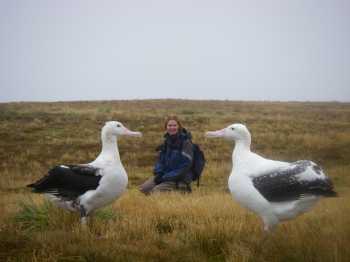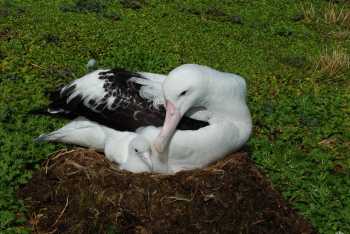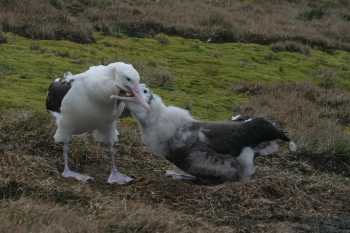After completing her BSc in 1996 and BSc Hons in 1997 at the University of the Witwatersand, Johannesburg, South Africa Genevieve Jones spent a year as an ornithological field assistant at the South African research station on sub-Antarctic Marion Island with the South African National Antarctic Programme (SANAP). She then completed an MSc in freshwater ecology at the University of Cape Town (UCT), but returned to avian research, working in the highlands and islands of Scotland and at sea in the South Atlantic before returning to South Africa where she completed her PhD and graduated this year.
For her PhD research under the supervision of Associate Professor Peter Ryan of the Percy FitzPatrick Institute at UCT Genevieve spent two further years overwintering on Marion Island where she collected data that continued 25 years of unbroken individual Wandering Albatross Diomedea exulans breeding histories. Her thesis sought to investigate why some of these faithfully monogamous birds that can live for 60 years are so good at producing chicks whereas others seldom rear offspring. Although differences between good and poor parents remain elusive, cross-fostering eggs between good and poor parents showed that both phenotypic (breeding behaviour) and genotypic factors influence their reproductive success. She recorded males forcing copulations and females consenting to infidelity in these apparently faithful birds. Extra-pair paternity occurred in 18% of the pairs and may be less costly to females than divorce and mate swapping. Although there are more males than females in the adult population, Genevieve found that more female chicks are produced. Mothers with good body condition were more likely to produce males, probably because it requires more energy to raise the larger male chicks. She also confirmed that older, more experienced adults are better parents. They protect their chicks for longer, and apparently deliver more food, because their chicks grow faster than those of parents with limited breeding experience.

Genevieve Jones with a pair of Wandering Albatrosses on Marion Island
The noticeably larger male is on the right
The thesis abstract follows:
"Long-term breeding monitoring of uniquely ringed Wandering Albatrosses Diomedea exulans at sub-Antarctic Marion Island shows that some individuals and pairs are highly productive whereas others seldom rear young. To conserve threatened species it is important to protect the productive individuals, and so I aimed to identify factors accounting for individual-level variation in long-term reproductive success. I examined current breeding characteristics that might explain past reproductive performance amongst experienced breeders.
Despite Marion Island being more than 1000 km farther north than South Georgia, breeding started 6 days later, possibly to limit the exposure of small chicks to severe weather conditions in autumn at the more southerly location. Molecular sexing found that more female (56%) than male chicks were raised over four years. Amongst experienced mothers, better condition (derived from mass-size indices) enabled production of male chicks, the more energetically demanding sex, in agreement with Trivers-Williard hypotheses. However, parents with good reproductive histories tended to produce females, the less costly sex.
Microsatellite paternity testing revealed that both male forced copulations and consensual female infidelity resulted in 14% - 24% of males being cuckolded. Despite a tendency for specific pairs to engage in either repeated extra-pair paternity (EPP) or repeated within-pair paternity, EPP was not used by females with poor reproductive pasts to increase their productivity. There were no clear genetic benefits from EPP; it may counter mate incompatibility due to low genetic diversity in the population and/or be an adaptive alternative to mate swapping, facilitated by the lack of discrimination against extra-pair young by cuckolded fathers.
Amongst all adults, age and experience had the greatest impact on breeding behaviours. Experienced parents, although in better condition, spent less time in the colony and with their partners prior to laying, indicating that experience enables greater efficiency in breeding. Egg size increased with maternal age and experience. Mature parents also provided greater chick protection and their chicks grew faster, confirming that breeding competency is an acquired skill. Birds arriving earlier and staying longer in the colony prior to laying were more likely to go on to breed. Birds in better condition arrived earlier and stayed longer than those in poor condition. Amongst experienced birds, males with successful histories spent more time ashore and successful females spent more time with their mates, suggesting a relationship between pre-laying behaviour and long-term reproductive success. Most characteristics investigated failed to distinguish experienced parents with productive and impoverished pasts, suggesting that there is little variation in breeding behaviours, possibly due to selection for successful breeding characteristics. However, variation between individuals in reproductive characteristics (e.g. egg size and parental care) supports the idea that individual variation drives differences in reproductive success. A cross-fostering experiment suggested that both parental behaviour and inherent characteristics control breeding success."


Wanderers brooding and feeding chicks on Marion Island
Photographs by Genevieve Jones
Jones, M.G.W. 2011. Individual variation in reproductive success in the Wandering Albatross. PhD thesis, University of Cape Town, South Africa.
With thanks to Genevieve Jones for information and photographs.
John Cooper, ACAP Information Officer, 3 January 2011
Footnote: I was responsible for setting up long-term demographic monitoring of Wandering Albatrosses at Marion Island more than three decades ago. At that time women were not allowed by the authorities to spend a year at the island. It is thus a very great pleasure for me to see a new generation of researchers, including women, successfully studying some of the very same long-lived birds that I banded (and their subsequent offspring) all these years later. You go sister!

 English
English  Français
Français  Español
Español